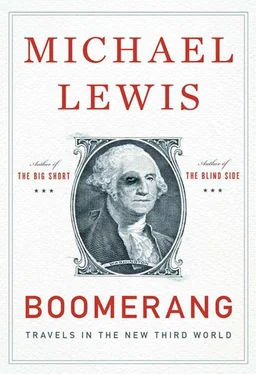That was a good question. Not for church; I was there for money. The tsunami of cheap credit that rolled across the planet between 2002 and 2007 has just now created a new opportunity for travel: financial-disaster tourism. The credit wasn’t just money, it was temptation. It offered entire societies the chance to reveal aspects of their characters they could not normally afford to indulge. Entire countries were told, “The lights are out, you can do whatever you want to do and no one will ever know.” What they wanted to do with money in the dark varied. Americans wanted to own homes far larger than they could afford, and to allow the strong to exploit the weak. Icelanders wanted to stop fishing and become investment bankers, and to allow their alpha males to reveal a theretofore suppressed megalomania. The Germans wanted to be even more German; the Irish wanted to stop being Irish. All these different societies were touched by the same event, but each responded to it in its own peculiar way. No response was as peculiar as the Greeks’, however: anyone who had spent even a few days talking to people in charge of the place could see that. But to see just how peculiar it was, you had to come to this monastery.
I had my reasons for being here. But I was pretty sure that if I told the monk what they were, he’d throw me out. And so I lied. “They say this is the holiest place on earth,” I said.
I’d arrived in Athens just a few days earlier, exactly one week before the next planned riot, and a few days after German politicians suggested that the Greek government, to pay off its debts, should sell its islands and perhaps throw some ancient ruins into the bargain. Greece’s new socialist prime minister, George Papandreou, had felt compelled to deny that he was actually thinking of selling any islands. Moody’s, the rating agency, had just lowered Greece’s credit rating to the level that turned all Greek government bonds into junk—and so no longer eligible to be owned by many of the investors who owned them. The resulting dumping of Greek bonds onto the market was, in the short term, no big deal, because the International Monetary Fund and the European Central Bank had between them agreed to lend Greece—a nation of about eleven million people, or two million fewer than Greater Los Angeles—up to $145 billion. In the short term Greece had been removed from the free financial markets and become a ward of other states.
That was the good news. The long-term picture was far bleaker. In addition to its roughly $400 billion (and growing) of outstanding government debt, the Greek number crunchers had just figured out that their government owed another $800 billion or more in pensions. Add it all up and you got about $1.2 trillion, or more than a quarter-million dollars for every working Greek. Against $1.2 trillion in debts, a $145 billion bailout was clearly more of a gesture than a solution. And those were just the official numbers; the truth is surely worse. “Our people went in and couldn’t believe what they found,” a senior IMF official told me, not long after he’d returned from the IMF’s first Greek mission. “The way they were keeping track of their finances—they knew how much they had agreed to spend, but no one was keeping track of what he had actually spent. It wasn’t even what you would call an emerging economy. It was a third world country.”
As it turned out, what the Greeks wanted to do, once the lights went out and they were alone in the dark with a pile of borrowed money, was turn their government into a piñata stuffed with fantastic sums and give as many citizens as possible a whack at it. In just the past twelve years the wage bill of the Greek public sector has doubled, in real terms—and that number doesn’t take into account the bribes collected by public officials. The average government job pays almost three times the average private-sector job. The national railroad has annual revenues of 100 million euros against an annual wage bill of 400 million, plus 300 million euros in other expenses. The average state railroad employee earns 65,000 euros a year. Twenty years ago a successful businessman turned minister of finance named Stefanos Manos pointed out that it would be cheaper to put all Greece’s rail passengers into taxicabs: it’s still true. “We have a railroad company which is bankrupt beyond comprehension,” Manos put it to me. “And yet there isn’t a single private company in Greece with that kind of average pay.” The Greek public-school system is the site of breathtaking inefficiency: one of the lowest-ranked systems in Europe, it nonetheless employs four times as many teachers per pupil as the highest-ranked, Finland’s. Greeks who send their children to public schools simply assume that they will need to hire private tutors to make sure they actually learn something. There are three government-owned defense companies: together they have billions of euros in debts, and mounting losses. The retirement age for Greek jobs classified as “arduous” is as early as fifty-five for men and fifty for women. As this is also the moment when the state begins to shovel out generous pensions, more than six hundred Greek professions somehow managed to get themselves classified as arduous: hairdressers, radio announcers, waiters, musicians, and on and on and on. The Greek public health-care system spends far more on supplies than the European average—and it is not uncommon, several Greeks tell me, to see nurses and doctors leaving the job with their arms filled with paper towels and diapers and whatever else they can plunder from the supply closets.
Where waste ends and theft begins almost doesn’t matter; the one masks and thus enables the other. It’s simply assumed, for instance, that anyone who is working for the government is meant to be bribed. People who go to public health clinics assume they will need to bribe doctors to actually take care of them. Government ministers who have spent their lives in public service emerge from office able to afford multi-million-dollar mansions and two or three country homes.
Oddly enough, the financiers in Greece remain more or less beyond reproach. They never ceased to be anything but sleepy old commercial bankers. Virtually alone among Europe’s bankers, they did not buy U.S. subprime-backed bonds, or leverage themselves to the hilt, or pay themselves huge sums of money. The biggest problem the banks had was that they had lent roughly 30 billion euros to the Greek government—where it was stolen or squandered. In Greece the banks didn’t sink the country. The country sank the banks.
THE MORNING AFTER I landed I walked over to see the Greek minister of finance, George Papaconstantinou, whose job it is to sort out this fantastic mess. Athens somehow manages to be bright white and grubby at the same time. The most beautiful freshly painted neoclassical homes are defaced with new graffiti. Ancient ruins are everywhere, of course, but seem to have little to do with anything else. It’s Los Angeles with a past.
At the dark and narrow entrance to the Ministry of Finance a small crowd of security guards screen you as you enter—then don’t bother to check and see why you set off the metal detector. In the minister’s antechamber six women, all on their feet, arrange his schedule. They seem frantic and harried and overworked . . . and yet he still runs late. The place generally seems as if even its better days weren’t so great. The furniture is worn, the floor linoleum. The most striking thing about it is how many people it employs. Minister Papaconstantinou (“It’s okay to just call me George”) attended NYU and the London School of Economics in the 1980s, then spent ten years working in Paris for the OECD (Organisation for Economic Co-operation and Development). He’s open, friendly, fresh-faced, and clean-shaven, and like many people at the top of the new Greek government, he comes across less as Greek than as Anglo—indeed, almost American.
Читать дальше












